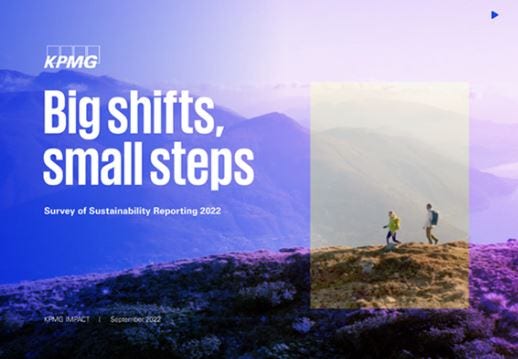Our survey shows that the N100 companies have continued to steadily increase their reporting rates with each global survey. Ten years ago, 64 percent of N100 companies reported. In 2022, 79 percent of these companies report.
Today, nearly all of the world's top 250 companies (G250) report on sustainability. In 2022, the rate of reporting among the G250 remains at 96 percent, the same as 2020.
Asia Pacific region continues to dominate in presenting sustainability data in annual reports
With 60 percent of companies reporting in 2022, the number of N100 companies including sustainability information in their annual financial reports has stabilized since 2017. Among the G250, however, we see a decrease of 8 percentage points since 2020 to 68 percent.
Among the N100, the Asia Pacific region has a particularly strong presence with 6 of the top 10 countries, territories and jurisdictions coming from this region.
Integrated reporting strong in Middle East and Asia Pacific
Integrated reporting – that is, a report that combines both financial and non-financial data in a single annual report – has taken hold, with 55 percent of N100 companies in the Middle East and 30 percent of N100 companies in Asia Pacific.
Widespread use of reporting standards
The KPMG survey analyzed three key reporting standards are the Global Reporting Initiative (GRI), the Sustainability Accounting Standards Board (SASB), and country stock exchange guidelines.
The GRI remains the most dominant standard used around the world, adopted by 68 percent of the N100 and 78 percent of the G250, with the Americas demonstrating the greatest uptake.
Nearly one-quarter of both the N100 and G250 use their domestic stock exchange guidelines or standards. There are particularly high adoption rates across the Middle East and Africa and Asia Pacific regions, with China at a reporting rate of 64 percent.
Over half of companies in the Americas report against the SASB standards, primarily driven by companies in the US and Canada. There is increasing uptake of SASB standards outside of the Americas, with 35 percent adoption among Europe's N100.
"In recent years, we have witnessed a tightening focus on environmental, social and other non-financial factors that are critical for business' long-term viability and success. Reinforced by increasing stakeholder demands for consistent and comparable data, there is now a robust momentum to move toward more harmonized non-financial reporting based on common metrics.
In this context, the World Economic Forum, in collaboration with KPMG, developed a set of baseline environmental, social and governance metrics to bring greater comparability to non-financial reporting and accelerate convergence among leading standard setters. Two years on, the progress is encouraging. One hundred and eighty-three global businesses, with a combined market capitalization of over US$6.5 trillion, are adopting the metrics, and the recently established International Sustainability Standards Board is making great strides in moving toward a global baseline for consistent and comparable nonfinancial reporting standards.
We are particularly pleased that KPMG’s survey confirms the incrementally increasing uptake in nonfinancial reporting. However, as the findings suggest, there is still room for improvement when it comes to businesses reporting on their carbon targets, and social and biodiversity risks. It is, therefore, imperative for businesses to lead the charge for transparency in non-financial reporting practices, setting the example for those that are a step behind. As jurisdictions race to introduce mandatory non-financial reporting requirements, businesses should ensure their non-financial reporting methods and structures are in place to deliver returns for their stakeholders and drive progress on the UN Sustainable Development Goals."
Professor Klaus Schwab
Founder and Executive Chairman of the World Economic Forum
Most companies are using materiality assessments
Materiality is the cornerstone of reporting and a useful starting point for companies of all sizes. Around the world, a significant majority of reporting companies in both the N100 (71 percent) and G250 companies (77 percent) are performing materiality assessments.
Assurance rates double among Chinese G250 companies but remain steady elsewhere
Independent external assurance of sustainability reporting information enhances the credibility of the reported information. Close to half of the N100 invested in independent third-party assurance. In 2020, the assurance rate decreased among the N100 companies. Following a decline in 2020, the G250 assurance rate increased in 2022, largely driven by trends in China.
Related Content

Jennifer Shulman
Lead Partner Economic Services in Canada, Global Lead ESG Advisory Hub
KPMG International




